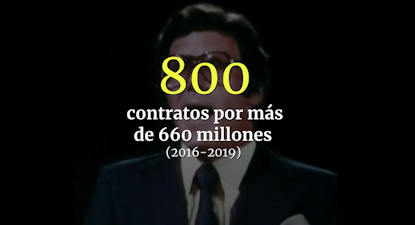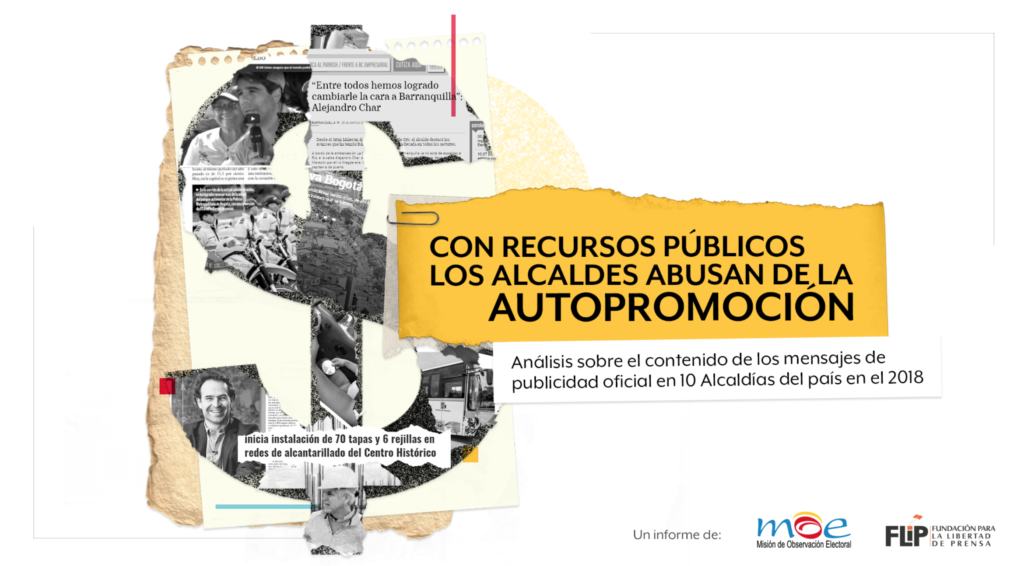What can be learned about political advertising from contracting data?

Press freedom and public procurement
Political ads are an important tool to enhance communication between public entities and citizens. They allow governments to provide information of public interest, however, their use in several Latin American countries, including Colombia, has become blurred, and many studies have shown the direct impact that political ad buy has on press freedom. Thus, in some cases, political advertising has become a tool of censorship used to punish critical media and reward those who remain silent about bad practices in public administration.
In order to understand the great influence that political ad buy has over public debates and the media ecosystem, it is important to analyze the contract of the first two years of Iván Duque’s administration in Colombia. During the first half of his administration, the president invested more than 26 billion Colombian pesos (around 7 million US dollars) in political ads, which were used to improve the president’s image.
These contracts focused on the purchase of favorable content in the media, the organization of interviews, and an extensive strategy on social media that included the elaboration of a list of influencers who were classified as positives, negatives and neutral in accordance with their position on the government. The president’s office also used these contracts to mitigate the impact of social movements upon his administration during 2019, by allocating multimillion-worth resources to organize campaigns to discourage the protests. These are all purposes contrary to the correct use of this tool.
During the last 10 years, The Press Freedom Foundation (FLIP) has documented and warned about the way in which public entities use political ad buy. In 2017, the Foundation created a project called Pauta Visible to draw attention to the existing relation between political ad buy, the media and press freedom.
The investigations carried out by Pauta Visible through figures obtained from contracting open data have shown that in Colombia the use of political ads directly affects freedom of press and the media’s editorial line. The project gathered information from 2283 political ad buys involving 75 public entities, which amounted to more than 850 billion Colombian pesos (around 230 million US dollars) within four years.

A recent Pauta Visible study examined which outgoing Colombian municipal and provincial governments awarded the most contracts and invested the most resources in advertising between 2016 and 2019 to identify common patterns that affect press freedom and fall outside the definition of political advertising. Identifying these patterns is important for many countries in the region and around the world, given that Colombia is not the only country in which the use of political advertising has a direct influence over freedom of speech and the media ecosystem.
The patterns identified by Pauta Visible that can also emerge in other countries are:
- Use of intermediaries and lack of transparency. Used as ways of executing political ad buys. In many cases, these patterns put the transparency of processes at risk, since they obstruct access to information about procurement processes and the direct beneficiaries of said awards. Likewise, many municipal and provincial governments do not upload their complete processes onto the Colombian electronic procurement system (SECOP by its initial in Spanish), and their answers to the requests of information have been incomplete and, in some cases, non-existent.
- The direct purchase of contents in the media without any kind of warning or signaling, that is to say, the purchase of news or interviews favorable to the administration, disguising institutional content as journalism. This is perhaps one of the most problematic patterns given that by means of these contracts, propaganda is disguised as information.
- Procurement of institutional programs, special transmissions, interviews to public officials and the mandatory attendance to press conferences and events of the administration.
In terms of procurement, effectiveness is one of its main characteristics. These three identified patterns are contrary to that principle:
- Contracts that do not aim at any specific communication need and are instead ambiguous and generic. These contracts serve as a “blank check”, executed with the media for a short period of time, in which the future publication of institutional information is ordered. This can jeopardize the media’s editorial line. There is a lack of a clear and unified definition of political advertising; therefore, the subject matter of these contracts is used for non-informative purposes.
- Contracts aim to self-promote the image of an entity or any public official and not to inform citizens. We carried out an analysis of ten municipal governments, which determined that 58% of the messages had the purpose of promoting entities or their public officials.
- Lack of clear and technical criteria to select contractors, that is to say, governments award these contracts arbitrarily, since direct procurement amounts approximately to 50-60% which represents almost 90% of the allocated resources.
The lack of a clear and unified definition of political advertising generates confusion especially in local governments, and this provides an opportunity to be wrongfully used.
In addition to this, there is a lack of controls to help mitigate the impact of political advertising upon certain entities’ right to freedom of speech, entities such as the Office of the Attorney General and the Office of Comptroller General. These entities are more focused on the contractual aspect rather than on the negative influence of these processes over freedom of press.
FLIP has created a series of recommendations and proposals for those governments that have recently started their administrations in January this year.
We have contacted the new local and regional governments to carry out workshops and trainings on the use of political advertising. The best way to improve the use of this tool consists of creating good practices guidelines to be included in the public policy of the entities.
The need to communicate political actions will always exist. But entities must comply with some minimum requirements to guarantee transparency, effectiveness, objectivity and freedom of press within the processes. Our good practices guidelines include recommendations such as:
- Transparency: it is necessary that entities answer information requests, upload political ad buys onto SECOP, manage to establish the traceability of contracts, and ensure an active transparency of all intermediaries and contractors involved in political advertising processes.
- Objectivity and effectiveness: we believe that a local diagnosis of the existing media in influence areas is a good practice. This will allow for the consideration of objective criteria such as ratings, objective audience, the media’s character, prices, and the selection of contractors and the effectiveness of the message in its selection. In addition, entities should determine whether the information advertised is useful and conforms to the purposes of political advertising, and if such information is not misleading or is not focused on the self-promotion of a public official.
- Press freedom: it is important not to use political ad buy as a tool to exert pressure on the media. This means, contracts should avoid including requirements such as the elaboration of news, interviews, reports, media coverage of events, press conferences, or any other content that can affect the media’s credibility and editorial line.
Apart from the violence and the direct attacks against the press in Colombia, the main problem of media censorship stems from political ad buy. The media crisis, which mostly depends on the resources of political advertising, and the powerful financial muscle of political ad buys are threatening the independence of the media, and hence, citizen’s right to information. This way, guaranteeing transparency and dealing with the problem through a critical perspective contributes to reducing the culture of self-censorship in the country.